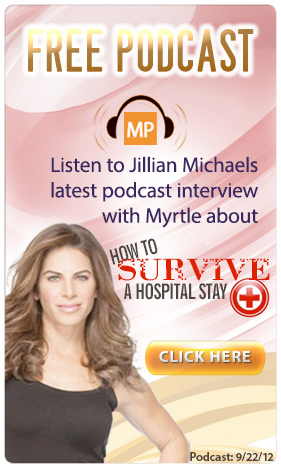Myrtle Potter’s Near-Death Experience Led Her To Found Health Care Media Business
Author: Janean Chun | Posted: 08/02/2012 10:25 am | View Original Article

Myrtle Potter was happy with her career as a health care corporate executive, having served as president and COO at Genentech, president at Bristol-Meyers Squibb and vice president at Merck. But her life took an unexpected turn one night in 2005 as she was resting in her family room. She started to hallucinate.
“The room was turning pink and green. It was absolutely beautiful and I had this insatiable desire to go to sleep,” Potter recalled. “I knew at the time it would be the best sleep I ever had, but I also knew from my training that if I went to sleep, I would never wake up.”
Potter was slipping into a coma. She was rushed to the hospital, where she ended up with a failing liver and lungs as well as total kidney failure. Toxins flooded her body, and she lost close to 30 pounds, more than half her hair and even some skin. “My skin was peeling off my body in sheets,” she said. “It was a horrific experience.”
While still undiagnosed, Potter fired her doctor. She then spent a year recovering from what turned out to be a severe allergic reaction to a medication. “I had plenty of time to contemplate what I would do next. I could go back to corporate America where I felt very comfortable,” she said, “but I couldn’t shake the lessons I learned.”
She started two companies to help deal with gaps she saw in health care — Myrtle Potter & Co., a B2B healthcare company, and Myrtle Potter Media Inc., a company that helps consumers navigate the U.S. health care system. Potter has established herself as a health care expert through her online content and media appearances, providing patients with practical information from how to get the right insurance to how to have a dialogue with their doctors.
HuffPost Small Business caught up with Potter to find out how the executive-turned-patient fought back from death to start a business that could save the lives of others.
Did you feel you were genuinely helping people as a corporate executive?
Absolutely. I was at Merck when Merck introduced the first cholesterol-lowering drug. And when we discovered the first protease inhibitor, we thought we had cured AIDS. I will never forget getting the scientific results and crying in the conference room because we thought we’d made that kind of mark on health care. I knew every single day that I was making a difference in the lives of patients, and had I not felt that gratification, I couldn’t have done it for that long. It was wonderful to get titles and to make more money, but for me personally, I wanted to make a difference in the world, and health care did that for me.
Did you see anything wrong with the so-called system while you were working in it?
I don’t know that you can be an executive in the health care system without understanding its shortcomings. I understood the gaps, but what I didn’t fully understand was how difficult it was at the patient level — regardless of age, education or money — to navigate the system. Even the simple act of finding the right doctor is so complicated. Having worked on the other side of the system, as I was fighting for my life, I was also grateful because I knew people and had the right care. If I didn’t have my experience and background and hadn’t aggressively advocated for myself, I would probably be dead today.
What were you most surprised by, being on the other side of the system?
We have one of the most incredible health care systems in the world, but it’s complicated. My insight was not that the system is broken. My insight was that patients are not provided a ton of information about how to get through it as easily and as painlessly as possible. We as consumers have great responsibilities placed on us, from our own care to the care of our children and parents, and we just have to get smarter. The more we educate ourselves, the more we can get out of the system.
And you believed you could fill that gap in education?
I knew the system from the perspective of an architect, from the eyes of a caregiver to parents and children with chronic health issues, and then finally from the vantage point of a dying patient desperate to get out of the system what I needed to live. I knew something as simple as having a copy of your medical history instead of waiting five days for the system is important when those could be five days you don’t have.
So do you feel you went through that horrific experience for a reason?
I certainly wouldn’t want to go through it again, but if you appreciate and respect who you are, you have to appreciate and respect what you went through to make you who you are.
Entrepreneur Spotlight
Name: Myrtle Potter
Companies: Myrtle Potter & Co., B2B company working with health care providers; Myrtle Potter Media Inc., content company that helps consumers navigate the U.S. health care system
Age: 53
Location: San Jose, Calif.
Founded: Myrtle Potter & Co., 2005; Myrtle Potter Media, 2009
Employees: 5, plus network of about 50 experts/independent contractors
2012 Projected Revenue: Not disclosed, content from Myrtle Potter Media reaches up to 153 million Americans each year; Myrtle Potter & Co. has grown fourfold in the past six years.




